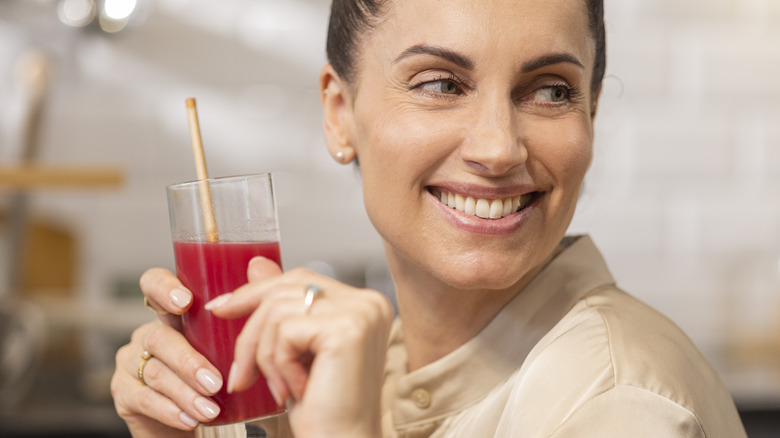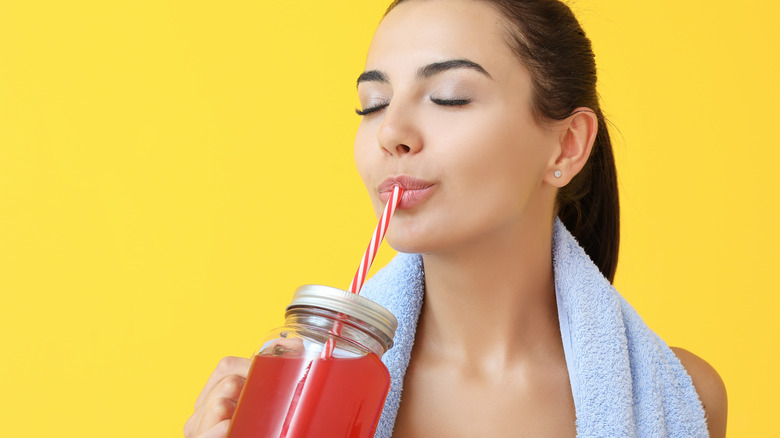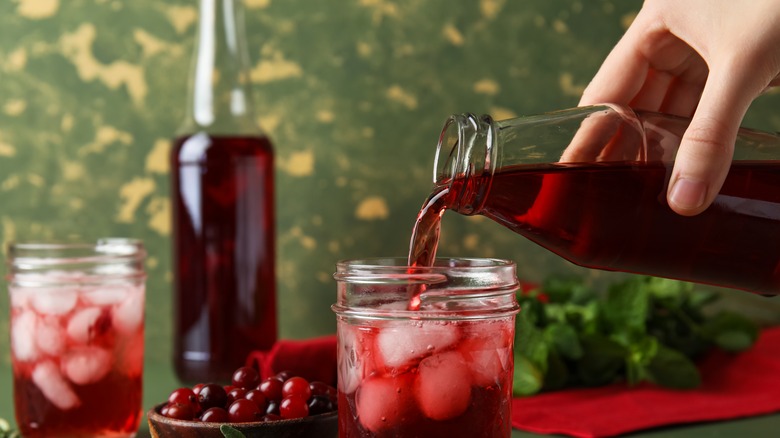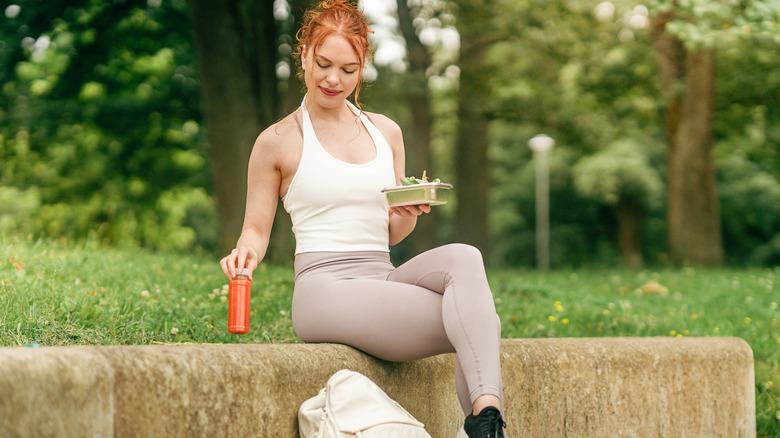Drinking Cranberry Juice Every Day Has An Unexpected Effect On Your Risk Of Breast Cancer
Breast cancer remains one of the top two cancers affecting women. According to the American Cancer Society, each year, over 300,000 women in the United States find out they have breast cancer, and more than 42,000 with breast cancer die.
Though there's no way to completely eliminate the risk of developing breast cancer, embracing an anti-cancer diet may help. Anti-cancer foods aren't hard to find: As the American Institute for Cancer Research (AICR) notes, cancer-fighting foods are as close as your nearest grocery store. From kale to flaxseed and oranges to walnuts, plenty of foods are rich in nutrients that may reduce your chances of being diagnosed with breast cancer in the future. And this long list includes cranberries. Known for their rich red hue and pucker-worthy tart taste, cranberries originated in North American wetlands. The U.S. Department of Agriculture explains that early European settlers began to use cranberries in their cooking by the 17th century. Today, cranberries have become a staple culinary item during many November and December holidays.
However, cranberries aren't just relegated to being a seasonal favorite in their whole form; they're also frequently consumed as juice. Though not as popular as apple or orange juice, cranberry juice is typically available in the juice aisle. If you appreciate its distinctive tang as a beverage, you'll be happy to learn that cranberry juice retains many of whole cranberries' nutrients, making it a powerful ally in the battle against breast cancer.
Rich in more than just color
WebMD outlines the nutritional elements that make cranberry juice a good addition to an anti-cancer meal plan. Not only does a single eight-ounce glass of cranberry juice offer up around one-fourth of the daily vitamin C the average person needs, but it also contains plenty of antioxidants, like quercetin and anthocyanins.
Per a 2016 review in Antioxidants, studies show that cranberry derivatives (like juice) could potentially inhibit cancer development in the cell lines connected with breast cancer. Specifically, quercetin was named as one of the antioxidant compounds that had been shown to decrease those lines. A 2020 article in the Journal of Berry Research examined the possible chemopreventive action of cranberry juice. The authors noted that cranberry juice might be able to help kill tumor-causing cells and provide anti-inflammatory assistance within the body.
While this is exciting news, especially if you like to reach for natural treatments when possible, research published by the AICR cautions that cranberry juice may not provide the same preventative outcomes for all people. Because each person's gut microbiome is unique, the systemic accessibility of cranberry compounds may vary between individuals. This helps explain why some women may get more protection from drinking cranberry juice than others.
Enjoying cranberry juice healthfully
Whether or not you're actively seeking out breast cancer-fighting foods, you may like the idea of increasing your intake of cranberry juice regardless for its nutritional benefits. Just remember to follow a few rules to incorporate it healthfully into your everyday eating.
First, opt for the right kind of cranberry juice. Many cranberry juices include quite a bit of added sugar, which you don't need. Per Healthline, a one-cup serving of cranberry juice contains 30 grams of sugar. (Yikes.) Adding more could cause a sugar overload or even a sugar spike if you're diabetic.
Second, make sure cranberry juice isn't going to interact with any medications you're taking. According to WebMD, cranberry consumption may interfere with the effectiveness of some blood thinners, weight loss drugs, calcium channel blockers, anti-inflammatory pharmaceuticals, and medicines that are changed within the liver. Finally, go easy on the amount of cranberry juice you drink each day (and not just to limit your sugars). Some people who consume cranberry juice experience gastric problems like an upset stomach or loose stools.
Additional breast cancer prevention foods
There are other foods out there with cancer-fighting potential (and they go great with cranberry juice, to boot). Leafy greens and cruciferous vegetables are naturally low in sugar and may keep breast cancer cells from forming. In a 2024 study in Nutrition Research, authors investigated the effect of various produce on breast cancer risk based on the vegetables' colors. They found concluded that for the Korean female population that made up the sample, white and green produce seemed to bring down their breast cancer risk the most.
Berries, including blueberries, are another good option. According to a 2021 study in Molecules, blueberry compounds such as polyphenols "may modulate susceptibility to breast cancer." As a result, the study authors suggested that polyphenol-rich blueberry preparations could possibly be used to both lower breast cancer risk and perhaps slow down active cancer's progress.
Ultimately, there's no magic food to protect against breast cancer. But drinking cranberry juice — and maybe pairing it with a green salad or blending it into a spinach-berry smoothie — could decrease your chance of being diagnosed.




